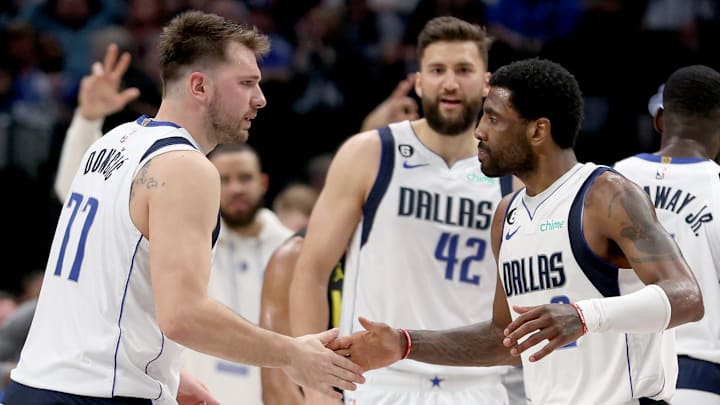Recently, Zach Buckley of Bleacher Report ranked the Dallas Mavericks as the fifth-most confusing roster in the NBA. The ranking goes as follows: 5. Mavericks, 4. Houston Rockets, 3. Toronto Raptors, 2. Minnesota Timberwolves, 1. Chicago Bulls, with the Portland Trail Blazers as a notable exclusion due to the Damian Lillard trade saga.
In his blurb about the Mavs, he mentioned the roster confusion beginning with the failed re-signing of guard Jalen Brunson. Of course, as all Mavs fans remember, Brunson bolted for New York last offseason after the Mavs were initially reluctant to offer him a substantial deal.
Dallas Mavericks listed as one of 'most confusing rosters' in NBA
With a record hovering around the .500 mark last season and Brunson exceeding expectations in New York, Dallas decided to acquire Kyrie Irving. The Mavs added Irving in exchange for draft picks, two-way wing Dorian Finney-Smith, and combo guard Spencer Dinwiddie.
After the Irving deal, the Mavs finished the season with a losing record. Dallas went 9-18 after the trade while reportedly tanking to retain a high draft choice.
The defense was largely to blame after last season's debacle. After the trade, the Mavs allowed every opponent they played to score more than 100 points. However, the Mavs went into the off-season with a plan to fix the leaky unit.
Buckley mentioned some of the Dallas offseason additions as potential solutions to the Mavs' defensive woes—namely free agent addition Grant Williams and 12th overall pick Dereck Lively II.
Nevertheless, Buckley also questioned if adding Williams and Lively II will truly improve the Mavs' lousy defense, also pondering whether or not Josh Green's offense will improve enough to warrant more time on the hardwood.
There are numerous questions that will take time to be answered, but unlike the other teams listed, the Mavs at least have a direction.
The Rockets are listed because they have a young core but spent money extravagantly during free agency. It is certainly valid to question if Houston spent the money to actually improve or just because they had it.
It sure seems like the latter. Especially because the Rockets spent $86 million on jettisoned forward Dillon Brooks. And signing reserve big Jock Landale to a 4-year $32 million pact was questionable at best.
The Raptors seem to be tip-toeing the line of mediocracy. After a middling record last season, the Raptors lost arguably their second-best player to the aforementioned Rockets. To make up for the loss of Fred Vanvleet, they signed Dennis Schroder to fill the void.
While holding out on a trade for multiple different players, the Raptors' direction is surely in question. Are they looking to tear it down? Or are they going to run it back with a worse roster?
Next, the Timberwolves and Bulls are in a similar place. Both rosters are competitive, but not impressive.
The Wolves mortgaged their future for big man Rudy Gobert, so they are consequently in win-now mode. But, the roster doesn't mesh well with centers Gobert and Karl-Anthony Towns, particularly in an era where shooting and spacing remain supreme.
As for Chicago, they seem to be content with their current roster. They finished last season with a 40-42 record, falling short of the playoffs. In an attempt to stay relevant, they have retained their own free agents. Furthermore, Chicago has seemingly lacked interest in trading franchise stalwarts Zach Lavine and DeMar DeRozan.
All things considered, Dallas has a solidified direction, and this offseason proved that to be true. The Mavs made the Western Conference Finals in 2022, and the core roster largely remains intact from that team, swapping Brunson and Finney-Smith for Irving and Williams, respectively.
Although many questions linger regarding the Dallas roster, these questions have been answered, in theory. Most importantly, Dallas has a transcendent talent on their roster. With Luka Doncic in tow, the Mavs should surely compete for years to come, no matter what questions persist.
